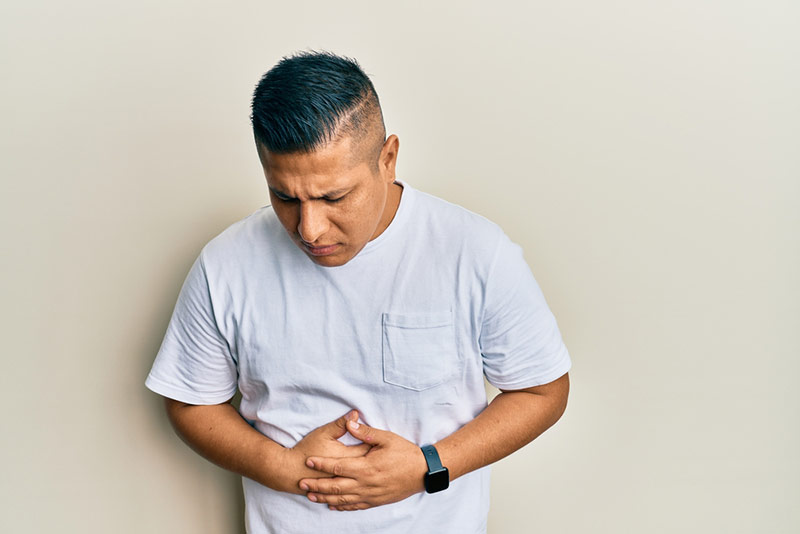Everyone has experienced stomach pain at some point in their lives. Often harmless, stomach issues usually disappear within hours or a few days. Symptoms such as nausea, indigestion, bloating, diarrhea and constipation are common, so it may be tough to know when stomach pain becomes a medical emergency.
If stomach pain persists for several days or becomes intense, it may be time to seek medical care. Knowing the common symptoms can help you determine whether your stomach pain is serious and when to go to the emergency room. Hospital emergency departments offer 24/7 care and can quickly diagnose and treat your stomach pain when it becomes urgent.
Different Causes of Stomach Pain
Stomach pain is experienced differently by everyone. While some people have mild symptoms that last only a few hours, others may experience extreme pain that lasts for days.
The common types of stomach pain include:
Acute pain usually comes on suddenly and is caused by something specific.
Chronic pain is ongoing and can last weeks or months.
Progressive pain becomes worse over time and comes with other symptoms.
By identifying the region where you feel pain, your healthcare provider may be able to narrow down the kind of pain you’re experiencing. The doctor may ask if the pain is in one of the following areas of the stomach:
- Right upper quadrant
- Left upper quadrant
- Right lower quadrant
- Left lower quadrant
Stomach pain can have many causes. Some causes are mild, while others are more serious underlying conditions. Each condition comes with a different set of symptoms.
Here are some of the most common causes of stomach pain:
- Indigestion
- Constipation
- Menstrual cramps
- Irritable bowel syndrome (IBS)
- Stomach Virus
- Crohn’s disease
- Food poisoning
- Food allergies
- Excess Gas
- Urinary tract infection
- Abdominal muscle strain or pull
- Hernia
- Gallstones
- Kidney stones
- Endometriosis
- Gastroesophageal reflux disease (GERD)
- Appendicitis
- Diverticulitis
When to Go to an ER for Stomach Pain
So, how do you know when it’s time to head to the ER for stomach pain? Most episodes of stomach pain are nothing to worry about and will resolve on their own. However, it may be time to seek medical attention when stomach pain progresses, and you begin to develop other symptoms.
If the following symptoms accompany your stomach pain, it may be time to go to the emergency room:
- Abdomen is extremely hard
- Abdominal tenderness when touched
- Coughing up or vomiting blood
- Persistent vomiting
- Bloody diarrhea
- Chest pain
- Difficulty with breathing
- Dizziness
- Fainting
- Trouble having a bowel movement
- Vision changes
How ERs Treat Stomach Pain
Stomach pain and other medical emergencies can happen at all hours of the day. That’s why hospital emergency departments offer 24-hour emergency care. Visiting an emergency room can be a scary experience, but knowing what to expect can help you prepare.
When arriving at your hospital’s emergency department, know that you are seen in the order of medical severity. You will first be seen by a triage nurse who will document your symptoms and place you in a priority queue with others receiving care.
Next, the nurse will take you into an exam room, where emergency medical staff will examine you to determine the right course of treatment. They will likely take a medical history, review your medications, go over your symptoms, and perform an exam. At this time, your doctor may order further testing to help diagnose your condition.
Below are some common diagnostic tools to evaluate your stomach condition:
- Abdominal X-ray
- Abdominal CT Scan
- Magnetic Resonance Cholangiopancreatography
- Abdominal ultrasound
- Blood and urine analysis
Once your doctor has determined the cause of your stomach pain, they can begin treatment. Treatments can vary depending on the severity and cause of the pain. You may be offered medication to help treat inflammation, acid reflux, ulcers, or infection. If they are concerned about dehydration from vomiting or diarrhea, they may start you on IV fluids. For more severe conditions involving the internal organs, surgery may be needed.
What Happens After Your ER Visit
Emergency room visits are intended to treat and stabilize acute illnesses and injuries. Following your treatment, your healthcare provider will determine whether you can be discharged or need to be hospitalized for further treatment. If discharged, you often must stay for a short period to ensure you are stable and safe to go home. Hospital staff may give you medication and instructions for returning home.
It is important to always follow up with your primary care doctor after a trip to the emergency room. When it comes to a stomach condition, your doctor may want to do a more thorough exam to evaluate you for underlying health concerns.
Emergency Care at Community Hospital of Huntington Park
Medical emergencies can happen unexpectedly at any time, so it’s important to know where to go for care. At Community Hospital of Huntington Park, we offer 24/7 emergency services for fast and efficient care. We’re committed to treating everyone who comes through our doors with compassion and the highest level of care.
While offering the same advanced treatment options as a large hospital, our emergency department is conveniently located close to home in a comfortable, personalized setting. Our on-site laboratory, pharmacy, and radiology ensure thorough, comprehensive treatment.
If you are unable to take yourself or a loved one to the hospital in the event of a medical emergency, always call 911.

